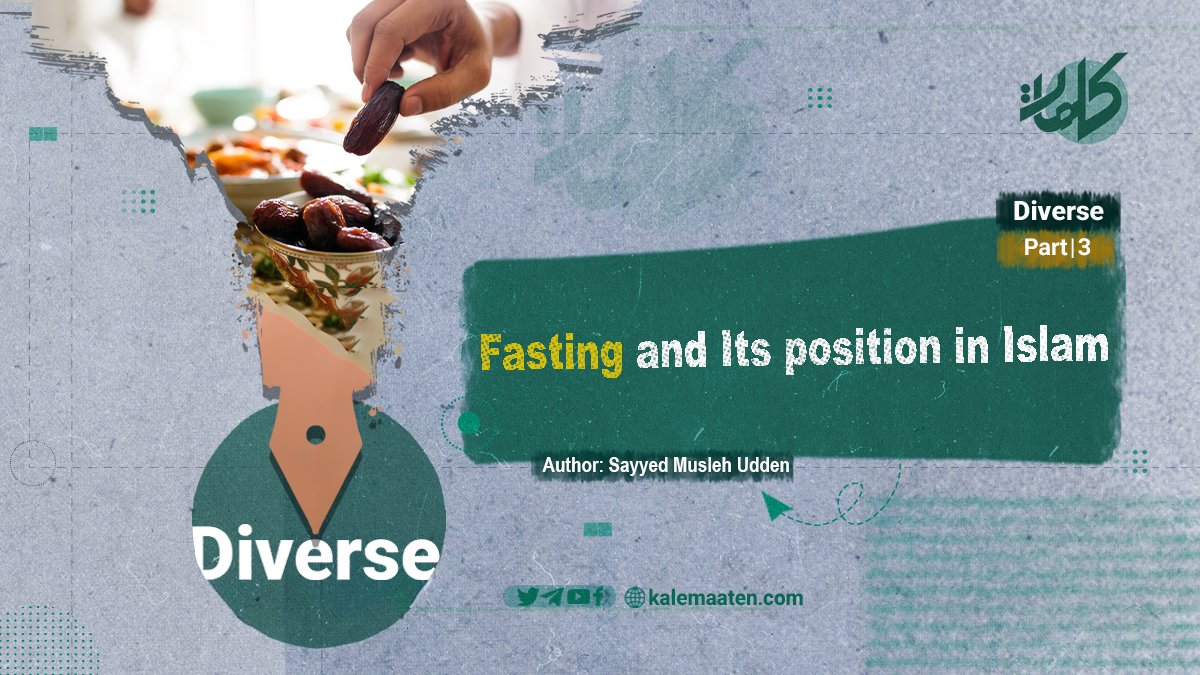
Author: Seyyed Musleh Uddin
Fasting and its Position in Islam (Part Three)
The Impact of the Victory of Either Spirit or Body in Human life and in the History of Religions and Ethics:
The religious and ethical history of humanity has been marked by a struggle between two natures: the divine nature and the animal nature. The result of this struggle has fluctuated between the two; sometimes the divine nature prevails, leading to extremes and excesses such as monasticism and an exaggerated asceticism in life, which abandon clean and permissible things. This often exhausts human nature and the soul, resulting in prolonged hunger, sleeplessness, and a retreat into forests and caves. In this context, happiness and spiritual development are viewed as torturing the soul and causing pain to the body, as evidenced by the story of the extremists of the Middle Ages in Europe.
«وَرَهْبَانِيَّة ابْتَدَعُوهَا مَا كَتَبْنَاهَا عَلَيْهِمْ إِلَّا ابْتِغَاء رِضْوَانِ اللَّهِ فَمَا رَعَوْهَا حَقَّ رِعَايَتِهَا» Translation: “And the monasticism which they themselves invented, we did not prescribe it for them except that it was to seek the pleasure of Allah, but they did not observe it as it was rightly observed.”
As a result, the intellect and body of humans began to weaken, relationships broke down, and human society faced pervasive threats. Humanity abandoned the position of caliphate that Allah Almighty had bestowed upon them, withdrawing from struggle and responsibility while envying and idolizing the angels instead of recognizing their own divine potential.
Conversely, the second nature—physical and earthly—has sometimes triumphed, pulling humanity away from rational and religious boundaries. Under the influence of material motives, people have become driven by their stomachs, known no limits in satisfying their bodily desires, and abandoned moral constraints. This has led to the extinguishing of the flame of the soul and heart. In such a state, the stomach has overshadowed the intellect and conscience, to the extent that food sufficient for a family or tribe is no longer adequate. An artificial and imaginary hunger has been created; no amount of food, drink, or material possessions can satisfy this endless craving. Consequently, oppression and crimes have arisen, transforming humanity into predatory beings who tear apart their fellow human beings and despise their family members.
The story of wars, raids, conquests, and victories—except for the holy religious jihad—reflects individual or group greed, infatuation with self-interest, leadership, and supremacy on earth.
The Effect of Gluttony and Greed on Morals and Tastes:
If this animal nature prevails and takes over control of life, ruling over human emotions and sensory powers, then any impediment that stands between individuals and their desires will lead to difficulty. Such an individual will not be able to find free time, a clear heart, an awake mind, or a living conscience. Worship, remembrance, and their accompanying practices will feel heavy and burdensome, and he will naturally not derive pleasure from them: «وَإِنَّهَا لَكَبِيرَةٌ إِلا عَلَى الْخَاشِعِينَ الَّذِينَ يَظُنُّونَ أَنَّهُم مُلاقُوا رَبّهِمْ وَأَنَّهُمْ إِلَيْهِ رَاجِعُونَ» Translation: “And indeed, it is difficult except for the humble; those who think that they will meet their Lord and that to Him they will return.”
«وَإِذَا قَامُوا إِلَى الصَّلاَةِ قَامُوا كُسَالَى يُرَآؤُونَ النَّاسَ وَلَا يَذْكُرُونَ اللهَ إِلَّا قَلِيلًا» Translation: “And when they stand up for prayer, they show themselves lazily to the people and remember Allah except for a little.”
Prophethood and its Role in Elevating Humanity:
Prophethood has made humanity aware by enacting the law of fasting to realize the high values and true goals of human existence. Prophethood has addressed humanity across different times and places—a humanity threatened by rebellious materialism. It has sought to restore the role of spirit, morality, love, and empathy, which have been stifled by the dominance of desires and selfish appetites. The goal is to establish justice and fairness in life and prepare humanity to fulfill its purpose for existence: the worship of Allah and the pursuit of desired perfection—namely, the caliphate and the responsibilities for which humanity was created.
This can only be achieved through a balance between angelic spirituality and the awareness of earthly existence; hence, Sharia has mandated fasting. Fasting serves to dull the strong urges of materialistic appetites and restore life, vitality, freshness, and strength to humanity. It also enhances spiritual clarity and faith, enabling individuals to observe moderation and balance in life, combat the impulses of lust, and mitigate the negative consequences of overeating. Ultimately, fasting prepares individuals to embody divine virtues, thrive spiritually, ascend toward the angelic realm, and enjoy experiences and pleasures beyond those found in material excesses.
Continues…


